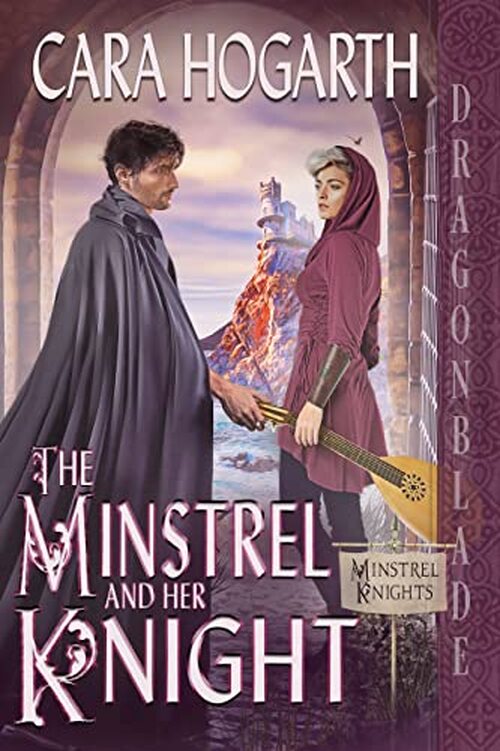“Sir William, I ask you to discard your knighthood for a season and become a wandering minstrel.”
Okay, I wasn’t very imaginative with my title. The Minstrel and Her Knight is exactly what the label suggests – a historical romance starring medieval minstrels. My hero, Sir William, is an English knight who has been emotionally scarred by fighting in France. He would much prefer to live a minstrel life. The only problem is that this is a one-way decision, and that way is precipitously down. Wandering entertainers were considered the dregs of society. Once Will has come out as a minstrel, his father will disown him and he’ll no longer be a privileged nobleman. What’s more, he’ll never be able to marry well, for what lady would ever wed a disreputable minstrel?
So Will hesitates. He doesn’t dare to follow his dream – until he is offered the chance to protect a talented musician through France while pretending to be a minstrel. Will leaps at the chance. The problem is, he doesn’t realise the young man he accompanies is also in disguise.
So why were medieval minstrels considered the lowest of the low? It was partly because many of them wandered from place to place for a living. A few respectable minstrels settled down with a rich patron or took a regular job in a town. But wandering entertainers were deeply suspect. Most medieval people were firmly tied to one location. Serfs had to live on their manor, lords were similarly defined by their properties, and townspeople fought hard for citizen-status of a specific town. Itinerant minstrels, however, had no community or lord to hold them accountable – which meant they probably got up to all kinds of lawless mischief.
But wandering was only part of the image problem. A minstrel made his or her living by entertaining people. People of lofty moral standards (church men for example) deemed such entertainment detrimental to the soul. Medieval theologian Thomas of Chobham, for example, looked down his celibate nose at musicians who “take part in public drinking-bouts and licentious gatherings, where they sing licentious songs to induce people to lasciviousness.” Sexy singing leads to general debauchery. Thomas, you’re such a prude.
There is yet another side to medieval music and poetry – that of the singer of courtly love, the troubadour. This is a far more respectable form of entertainment. My hero, Sir William, combines all three. He yearns for the free wandering life and to create beautiful music, but there’s also something about him that would raise Thomas of Chobham’s hackles, as my heroine, Azalais, notes when she first hears Will sing:
“Even before he sang a word, she knew it: this man was a performer. He knew how to command his audience. It seemed even the birds fell silent. Azalais too was no better than a spellbound sparrow.
Then he began to sing:
I love to see the lark hurl himself
Into the air, against the falling sunbeams,
And rise until he alights
On leaves trembling in the wind.
She knew the song, and William sang it as it should be sung – in the language of southern France, the langue d’oc. It was centuries old, a troubadour’s tune from the Golden Age of minstrels. All this she registered on some distant, logical level. But his voice, that seized hold of her senses. It wrapped a fist about her very heart and sent a shivering tingle through every fingertip – a voice as velvety as his speaking tone, only richer and fuller. It slid over the notes effortlessly, sounding the words with soft precision and weighing them with meaning only for her.
He looked at her as he sang. Those dark eyes flickered with secrets and his mouth … ah, his mouth was too fascinating to linger upon.”
I wove verses like these from medieval troubadour songs through The Minstrel and Her Knight. Sir William aims for the beautiful heights of courtly love songs, but his music stirs more primal emotions too. Can Azalais, disguised as the male minstrel Will must protect, resist his spell?
Disreputable minstrel or medieval rock-star? The power of music to stir the emotions. Some things never change.
THE MINSTREL AND HER KNIGHT by Cara Hogarth
Minstrel Knights #1
She would not trust this poseur with the beautiful hands to escort her across a cloister, let alone through half of France.
A lady disguised as a minstrel…
Yorkshire, 1367. Lady Azalais disguises herself as a minstrel to travel through war-torn France and ransom her father. Her brother plans to marry her to his brutish friend but Azalais, disillusioned with coarse and lustful men, hopes her father will let her become a nun instead.
An unnecessarily handsome knight-protector…
As an impoverished knight, Sir William must fight for his living–unless he can forge a life through his love of song. When offered a mission to protect a talented musician through France, Will seizes the chance to test his dream of becoming a minstrel–a dream that will prevent him from ever marrying.
Azalais distrusts William’s overt performer’s charm and her own reaction to it, yet she delights in their music-making. In turn, Will is strangely fascinated by his minstrel companion. As their shared passion for music and the dangers of the journey draw them closer together it becomes increasingly difficult for Azalais to conceal her identity.
But it is essential that Will continue to see her as a man, isn’t it?
Romance Historical [Dragonblade Publishing, Inc, On Sale: June 15, 2022, Paperback / e-Book, ISBN: 9781958098202 / ]
Buy THE MINSTREL AND HER KNIGHT: Amazon.com | Kindle | BN.com | Powell’s Books | Books-A-Million | Indie BookShops | Ripped Bodice | Love’s Sweet Arrow | Walmart.com | Book Depository | Target.com | Amazon CA | Amazon UK | Amazon DE | Amazon FR
About Cara Hogarth
Cara Hogarth writes historical romances set in a medieval past full of castles, knights, and damsels who definitely don’t need rescuing. Her stories sparkle with passion, adventure, and a touch of humor. Cara studied medieval history at university before realizing she much preferred writing fiction to research papers. Now she puts her historical training to good use by underpinning her romances with plenty of research. Her stories are usually set in fourteenth-century England and France.
Cara was born in Salisbury, England. She grew up on a sheep farm, but has since worked as a cake cook, in a fun fair, in a library, and as an academic tutor and editor. She now lives in the wilds of Western Australia with a book-eating ragdoll cat.




No Comments
Comments are closed.